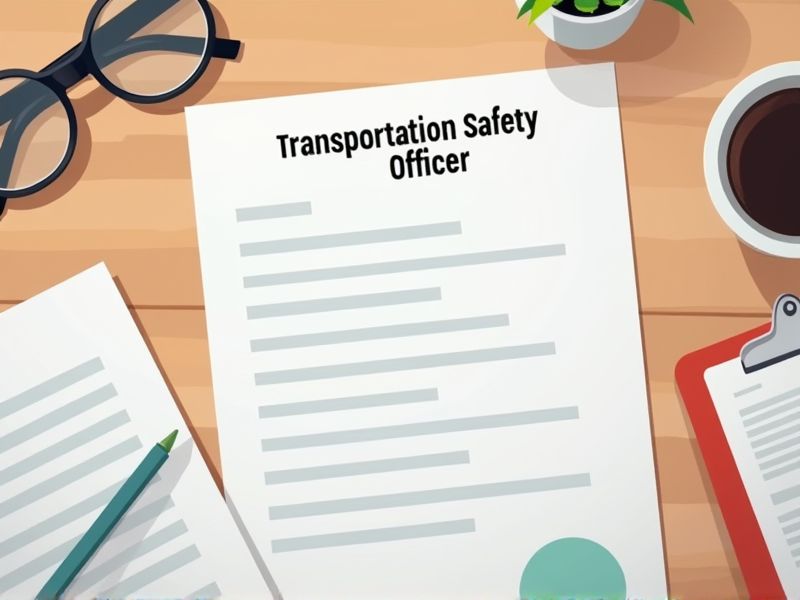
Ensuring the safety and security of public and private transportation systems is critical, necessitating highly trained individuals ready for potential challenges. Certifications provide Transportation Safety Officers with the necessary skills and knowledge to anticipate and manage risks effectively. With proper validation, officers can confidently enforce regulations and implement safety protocols. Key certifications enhance their competency and readiness for this vital role.
Transportation Worker Identification Credential (TWIC)
Transportation Safety Officers need a TWIC to ensure they have undergone thorough background checks, aligning with security protocols in sensitive areas. The credential grants them access to secure maritime areas, crucial for overseeing the safe movement of goods and personnel. Having a TWIC helps maintain uniform safety standards across transportation sectors, minimizing risks. Obtaining the credential demonstrates the officer's commitment to national security and regulatory compliance.
Commercial Driver's License (CDL) Endorsement
A Commercial Driver's License (CDL) Endorsement ensures that Transportation Safety Officers have met specific training and testing criteria, which enhances their ability to handle large vehicles safely. Meeting these standards translates into fewer accidents and incidents related to improper vehicle handling or maintenance. This endorsement allows officers to assess and understand the safety protocols required for commercial vehicles, promoting safer transportation practices. Businesses and government agencies prefer or require officers with a CDL endorsement as it reduces liability risks and ensures compliance with transportation regulations.
Hazardous Materials (HazMat) Certification
Hazardous Materials (HazMat) Certification equips Transportation Safety Officers with crucial knowledge to safely handle and oversee the transport of potentially dangerous substances. This certification ensures officers understand regulatory compliance, minimizing the risk of accidents during transit. Proper training in HazMat protocols enhances response efficiency in the event of spills or leaks, safeguarding both people and the environment. The certification reassures the public and industry stakeholders of a standardized commitment to safety and regulatory adherence.
OSHA 30-Hour Training Certification
The OSHA 30-Hour Training Certification equips Transportation Safety Officers with the knowledge to identify workplace hazards, fostering a safer environment. Enhanced understanding of safety protocols reduces the likelihood of accidents and ensures compliance with national safety standards. The certification also empowers officers to effectively communicate and enforce safety measures among team members. With comprehensive training, the risk of costly non-compliance fines is minimized, benefiting both the officers and the organization.
Certified Safety Professional (CSP)
Possessing a Certified Safety Professional (CSP) credential significantly enhances a Transportation Safety Officer's ability to identify and mitigate potential hazards, thereby reducing workplace accidents. The CSP designation ensures that the officer has undergone rigorous safety training, equipping them with the necessary skills to enforce safety regulations effectively. Without a CSP, there is an increased likelihood of oversight in safety practices due to a lack of updated knowledge on industry standards. The CSP credential also serves as a mark of credibility, which can lead to greater trust and cooperation from colleagues and stakeholders in implementing safety initiatives.
First Aid and CPR Certification
Transportation Safety Officers often encounter emergencies in transit environments where immediate response is necessary. First Aid and CPR certification equips them with the skills to provide critical, life-saving assistance during medical emergencies. Certification ensures they can maintain the safety and well-being of passengers and employees until professional medical help arrives. Knowledge of these skills enhances overall situational preparedness, reducing the potential severity of incidents.
Defensive Driving Certification
Earning a Defensive Driving Certification equips a Transportation Safety Officer with essential skills to anticipate and mitigate potential hazards on the road, thereby preventing accidents. Knowledge from this certification enhances an officer's decision-making abilities during high-pressure situations, reducing risks associated with transportation operations. The training emphasizes proactive safety practices, which aligns with organizational goals to minimize liability and ensure safe transit environments. It fosters a culture of safety and responsibility among officers, influencing overall safety standards within transportation sectors.
Emergency Response Training Certification
Emergency Response Training Certification equips transportation safety officers with the skills needed to effectively manage and mitigate accident scenarios, reducing potential harm. Proper training ensures compliance with safety regulations, leading to fewer legal and financial repercussions for organizations. Certified officers are better prepared to quickly assess situations, resulting in more efficient emergency response and improved safety outcomes. Certification fosters public confidence, as it demonstrates a commitment to maintaining high safety standards in transportation operations.
ISO 45001 Occupational Health and Safety Certification
ISO 45001 certification ensures Transportation Safety Officers are equipped with standardized practices, directly reducing workplace accidents. Consistent implementation of its guidelines fosters a culture of proactive risk management, which enhances the overall safety of transportation environments. This certification provides a structured framework for compliance with regulatory requirements, minimizing legal risks and fostering public trust. By aligning with ISO 45001, organizations demonstrate a commitment to employee well-being, potentially increasing job satisfaction and productivity among safety officers.
Incident Command System (ICS) Certification
The Incident Command System (ICS) Certification provides Transportation Safety Officers with a standardized approach to emergency response, ensuring coordinated and efficient operations. This certification enhances communication skills, enabling officers to effectively collaborate with other agencies during crises. Understanding ICS protocols allows officers to quickly adapt to evolving situations, reducing response times and mitigating risks. Certification also instills confidence in officers, as it equips them with essential knowledge and strategies to manage transportation-related incidents safely.
Summary
When you obtain certifications as a Transportation Safety Officer, your expertise and credibility in the field significantly increase. This enhanced proficiency can lead to improved decision-making skills and better safety protocols. Such credentials may elevate your career opportunities, potentially resulting in promotions or higher salary brackets. Organizations often experience reduced accidents and insurance costs when employing certified professionals like you.
